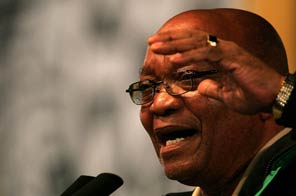Zuma urges more aid for Zimbabwe
HARARE: South African President Jacob Zuma on Friday urged donors to give more aid to Zimbabwe to revive the shattered economy, while telling the nation's feuding leaders to quickly mend their differences.
Six months after President Robert Mugabe joined Prime Minister Morgan Tsvangirai, the former opposition leader, in a unity government, they remain deadlocked over key appointments.
Tsvangirai also complains that his supporters still suffer harassment from police, all issues that Zuma indicated he would discuss with the leaders during his two-day visit.
Zuma met with Tsvangirai late into the night Thursday, and held nearly two hours of talks with him and Mugabe on Friday.
"The parties are in agreement on the need to speed up the implementation and find solutions to the current points of disagreement," Zuma said later in a speech at a farm show.
"As South Africa, we encourage donors to provide the development aid that is direly needed to ensure that the inclusive government is able discharge its responsibilities of turning around the political and socio-economic development situation in Zimbabwe," he said.
"We also emphasise that the parties in Zimbabwe should work together to remove any remaining obstacles to the implementation of the agreement," he said.
Western donors are providing humanitarian aid to ease crippling food shortages, but have demanded that Mugabe make greater political reforms before granting direct aid to the unity government.
Tsvangirai recently toured western capitals seeking to raise 8.3 billion dollars (5.8 billion euros) in aid but returned with no direct support for the national budget.
Zimbabwe has raised more than two billion dollars so far, mainly from African organisations and China.
But Mugabe, who at 85 has spent nearly three decades in power, faces pressure from within his own ZANU-PF to avoid any more concessions that would further weaken the party's grip on power.
During Zuma's trip, Mugabe sought to downplay his differences with Tsvangirai, calling their disputes "teething problems."
He has repeatedly insisted that western sanctions, including a travel ban and asset freeze on Mugabe and his inner circle, are undermining the country's efforts to revive the economy.
Despite the disputes, the new government has stabilised Zimbabwe's economy, largely by abandoning the local currency left worthless by years of world-record hyperinflation.
That has brought normality back to prices that last year rose daily, but the switch to foreign currency has left many poor Zimbabweans without access to any money, especially in rural areas.
Zimbabwe still faces a daunting humanitarian crisis, with 2.8 million people in need of food aid and fears of a new cholera outbreak, after the disease killed 4,200 people over the last year, according to the United Nations.
South Africa is Zimbabwe's leading trading partner, but even its efforts to invest in the country have been frustrated by Mugabe's refusal to offer guarantees, particularly for the security of land investments.






